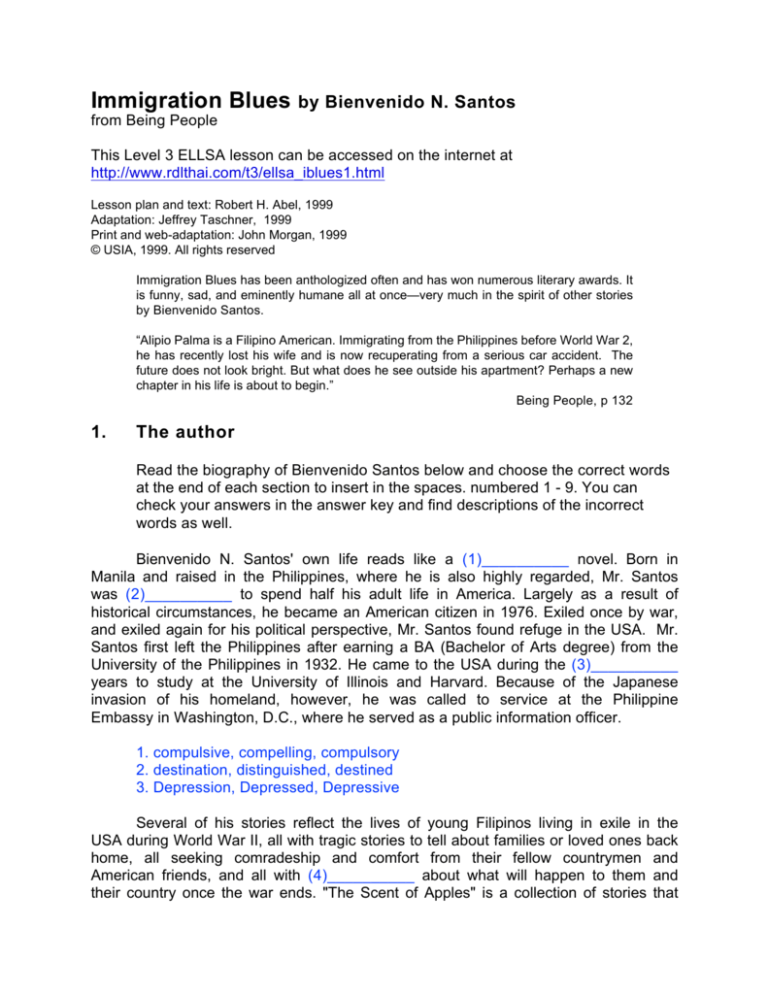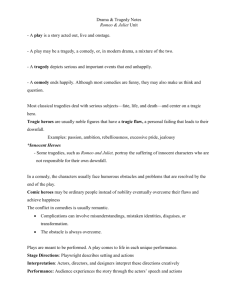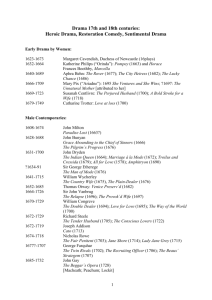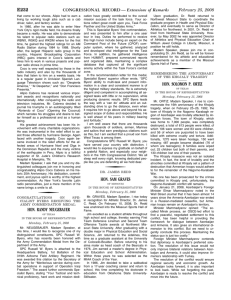
Immigration Blues by Bienvenido N. Santos
from Being People
This Level 3 ELLSA lesson can be accessed on the internet at
http://www.rdlthai.com/t3/ellsa_iblues1.html
Lesson plan and text: Robert H. Abel, 1999
Adaptation: Jeffrey Taschner, 1999
Print and web-adaptation: John Morgan, 1999
© USIA, 1999. All rights reserved
Immigration Blues has been anthologized often and has won numerous literary awards. It
is funny, sad, and eminently humane all at once—very much in the spirit of other stories
by Bienvenido Santos.
“Alipio Palma is a Filipino American. Immigrating from the Philippines before World War 2,
he has recently lost his wife and is now recuperating from a serious car accident. The
future does not look bright. But what does he see outside his apartment? Perhaps a new
chapter in his life is about to begin.”
Being People, p 132
1.
The author
Read the biography of Bienvenido Santos below and choose the correct words
at the end of each section to insert in the spaces. numbered 1 - 9. You can
check your answers in the answer key and find descriptions of the incorrect
words as well.
Bienvenido N. Santos' own life reads like a (1)__________ novel. Born in
Manila and raised in the Philippines, where he is also highly regarded, Mr. Santos
was (2)__________ to spend half his adult life in America. Largely as a result of
historical circumstances, he became an American citizen in 1976. Exiled once by war,
and exiled again for his political perspective, Mr. Santos found refuge in the USA. Mr.
Santos first left the Philippines after earning a BA (Bachelor of Arts degree) from the
University of the Philippines in 1932. He came to the USA during the (3)__________
years to study at the University of Illinois and Harvard. Because of the Japanese
invasion of his homeland, however, he was called to service at the Philippine
Embassy in Washington, D.C., where he served as a public information officer.
1. compulsive, compelling, compulsory
2. destination, distinguished, destined
3. Depression, Depressed, Depressive
Several of his stories reflect the lives of young Filipinos living in exile in the
USA during World War II, all with tragic stories to tell about families or loved ones back
home, all seeking comradeship and comfort from their fellow countrymen and
American friends, and all with (4)__________ about what will happen to them and
their country once the war ends. "The Scent of Apples" is a collection of stories that
focuses on this period and on the (5)__________ lives of several Filipinos in exile.
"Immigration Blues" comes from this collection, but is distinguished by being from the
most recent period in time. Also recommended from this collection, for people
interested in reading more of his work, is "Hurt Men." In this story, a group of Filipinos
in exile gather to play a game of poker. In the course of the story we learn that each of
the players has suffered some tragedy as a result of the war.
Mr. Santos himself returned to the Philippines after the war years and quickly
gained recognition as a writer of (6)__________. Ironically, his novel, A Praying Man,
serialized in the magazine "Solidaridad" so offended the government of Ferdinand
Marcos that he was forced into exile again and returned to the USA. What so offended
the Marcos government was apparently Mr. Santos' sympathetic and frank description
of the lives of poor Filipinos.
4. anxieties, anxious, animosity
5. interminable, interrogative, inter-related
6. statue, stature, station
In the USA, he continued his literary (7)__________, and sustained himself and
his family by teaching in American colleges. Before his death in 1996, his last position
was at Wichita State College in Wichita, Kansas. Besides "The Scent of Apples" and
"A Praying Man", Santos authored the story collections "You Lovely People" and "The
Day the Dancers Came". His novels include "Villa Magdelena", "The Man Who
(Thought He) Looked Like Robert Taylor", and "What the Hell For You Left Your Heart
in San Francisco". He also write the poetry collections "The Wounded Stag" and
"Distances in Time" and an autobiography. He won several literary awards both in the
Philippines and in the USA. In America, he was awarded an American Book Award, a
Guggenheim Fellowship, and a National Endowment for the Arts award. He received
the Philippines highest artistic award, The Cultural Heritage Award and in 1992 De La
Salle University, Manila named a writing center in his honor. Perhaps the most
surprising thing about Mr. Santos writing, given his personal history and the
(8)__________ histories of both his native and adopted countries during his lifetime, is
his enduring gentleness and humanity. A writer of political commitment, his novels and
stories are nevertheless about people rather than ideas, and express far more caring
concern than outrage. His stories are always gracefully told in a prose that moves
unobtrusively from to the colloquial to the eloquent. His themes are
large—displacement, exile, identity, desperation, guilt—but always derive organically
from the lives of the characters in his fiction and their very real experiences. And
somehow, though his characters may suffer and fate or others may be cruel and full of
(9)__________, Mr. Santos maintains a saving sense of humor. Without ever falling
into the excesses of sentimentality or nostalgia, his stories are always anchored in a
love for the people he writes about.
7. devices, endeavors, devotions
8. tumultuous, tumescent, turbulence
9. betrothal, betrayal, triviality
2.
Pre-story
The blues
"Feeling blue" means to feel sad, as does the phrase, "got the blues."
• Have you ever lived in another country and had to visit the immigration
department there?
• How would you feel if you were studying in the US for several years?
• Would you get homesick?
• What would you miss most about your homeland?
• What aspects of American life would be hard to get used to for you? If you
have studied or lived in another country (and if you have not ask a friend or
family member who has), write a short essay about your feelings when you
were overseas.
• What does the title 'Immigration Blues' mean to you? Send a letter or an email to a friend or family member who is living overseas (you may just cheer
them up!)
3.
In-story
Perspective
Like many of Bienvenido Santos' stories, "Immigration Blues" is deceptively
simple. Although it is written in colloquial language, the story really has great artistry.
For one thing, Santos shifts effortlessly from one point of view to another until we have
a rich understanding of the psychological dynamics of the situation.
• How does he change the point-of-view of the story in the second column on
p. 137?
• ___________________________________________________________
___________________________________________________________
• Where in the dialog is the point of transition?
• ___________________________________________________________
___________________________________________________________
• At what point does Santos take us back into Alipio's mind? Where is the first
signal of transition?
• ___________________________________________________________
___________________________________________________________
Check your answers in the answer key
Comedy and Tragedy: the helpless combination
Although Immigration Blues can be described as a comedy, the tragedies that
have brought these people together are very evident in the telling of the story.
Below you will see a list of events from the story that are either funny (comedy)
or disheartening (tragedy).
Decide whether the scenes are comic or tragic and then check your answers
with the answer key.
1.
Monica's awkward shyness
Comedy
❒
Tragedy
❒
2.
Alipio is a widower. (His wife, Semiang, had died from heart trouble.)
Comedy
❒
Tragedy
❒
3.
Mrs. Zafra's 'pal'—God
Comedy
❒
Tragedy
❒
4.
Alipio, laughing at the memory of Carlito, spits some of the rice out of his mouth.
Comedy
❒
Tragedy
❒
5.
Carlito and his cocks that won't fight. (And most Carlito references.)
Comedy
❒
Tragedy
❒
6.
Alipio’s house is a mess.
Comedy
❒
Tragedy
❒
7.
Alipio staring at Monica's legs at the end.
Comedy
❒
Tragedy
❒
8.
Alipio lives all alone.
Comedy
❒
Tragedy
❒
9.
Alipio missed out on his retirement benefits (because he was unable to work
after the accident).
Comedy
❒
Tragedy
❒
10.
Mrs. Zafra's heavy-handed hints about Monica.
Comedy
❒
Tragedy
❒
11.
Alipio's perfectly white, but noisy dentures that almost fall out at times.
Comedy
❒
Tragedy
❒
12.
Alipio and Mrs. Zafra's obsession with food and grocery shopping.
Comedy
❒
Tragedy
❒
13.
Alipio's resignation to the fact that he will die in the US, not in his homeland, the
Philippines.
Comedy
❒
Tragedy
❒
14.
Alipio's ugly experiences with American women.
Comedy
❒
Tragedy
❒
15.
Alipio walks with a limp. (His leg was badly injured in a car accident.)
Comedy
❒
Tragedy
❒
16.
Alipio is childless.
Comedy
❒
Tragedy
❒
17.
Immigration problems (extensions, overstays).
Comedy
❒
Tragedy
❒
18.
Mrs. Zafra's coaxing and coaching of Monica.
Comedy
❒
Tragedy
❒
19.
Alipio's immense stock of canned and frozen food.
Comedy
❒
Tragedy
❒
20.
Monica, in following her sister's lead, likes to eat everything Alipio eats, and
gets carried away by adding 'I eat rice, too.' (Rice is the staple food in the
Philippines, and it would be unthinkable that any Filpino wouldn't eat rice.)
Comedy
❒
Tragedy
❒
21.
Alipio cannot bear children.
Comedy
❒
Tragedy
❒
Efficient exposition
Immigration Blues is very efficient in its progress.
• How many characters does Santos introduce in just the first two sentences of
the story?
• What do we learn about Alipio in the first paragraph?
• How much of the setting is revealed?
Read the first paragraph (next page) and then compare your answers with ours
After checking your answers, think about Alipio.
• What are some of his problems?
check your answers in the answer key.
The first paragraph of Immigration Blues
“Through the window curtain, Alipio saw two women, one seemed twice as
large as the other. In their summer dresses, they looked like the country girls he knew
back home in the Philippines who went around peddling rice cakes. The slim one
could have passed for his late wife Seniang's sister whom he remembered only in
pictures because she never made it to the United States. Before Seniang's death, the
couple had arranged for her coming to San Francisco, filing all the required petition
papers to facilitate the approval of her visa. The sister was always "almost ready, all
the papers have been signed," but she never showed up. His wife had been ailing and
when she died, he thought that hearing of her death would hasten her coming, but the
wire he had sent her was neither returned nor acknowledged.”
Being People, page 132
The matchmakers: dropping hints
Again, as in many comedies, the plot is if and how this boy-meets-girl story will
end happily. The obstacles to this happy union and happy ending are first, Alipio,
because he does not understand the hints he is offered; and second, Monica, because
of the guilt she feels at trying to "seduce" Alipio into accepting—and marrying—her.
Mrs. Zafra does her best both to alert Alipio to the benefits of joining forces with
Monica and to encourage Monica herself to take some initiative.
Hints: Identify points in the story where the two women try to 'drop hints' or make
subtle suggestions to Alipio about Monica's availability and desire to get married.
Check the following lines in your book and continue the sentences below. You can
check your answers in the answer keys.
(p.134, bottom of second column)
Mrs. Zafra tells
(p. 135, bottom of first column)
Mrs. Zafra tells
(p. 135, middle of second column)
Mrs. Zafra tells
(p. 135, bottom of second column)
Mrs. Zafra tells
(p. 136, top of first column)
Monica rejoins
(p. 138, second column)
Monica announces
(p. 139, second column)
Monica says again and again
All's well that ends well (?)s
What does Santos reveal to us through this excerpt from the ending of
Immigration Blues on page 140? 'Alipio chuckled. He wanted to say, talk of lightning
striking same fellow twice, but he thought better of it...and this girl Monica...Moni, nice
name also. How can this one be lightning?'
Check the answer key
You may recall from the Level 2 story, The Cask of Amontillado, that Edgar Allan Poe
believed that the ending of the story should leave the reader with the 'fullest sense of
satisfaction.' How does Santos satisfy the reader with the ending of 'Immigration
Blues'?
Check the answer key
4.
Exercises
Cases of Immigration Blues
The exercises below summarize how have each of these characters
experienced Immigration Blues. Fill in the missing words from the list of words before
each paragraph.
Mrs. Zafra
marry
tracked
nun
extension
illegal
employment
elderly
Once she quit being a __________, Mrs. Zafra, was no longer entitled to stay in the
US and could not obtain __________, either. She became an __________ alien and
had to hide from the immigration investigators. After the Italian-American immigration
officer __________ her down, he only thing she could do to stay was to __________
an American citizen, so she decided to find an __________ Filipino with US
citizenship, Carlito. She married him before her one-week visa __________ ran out.
Seniang, Monica and Seniang's sister
scheme
officers
probably
become
file
visa
stay
especially
citizen
Seniang also had to hide from the Immigration __________. She married Alipio
because he was a US __________ (even though Alipio could not have children) so
she could __________ in the US. Monica had to agree to her sister's __________ to
get Alipio to marry her so she could __________ an American citizen and stay in the
US. Alipio and Seniang had to go through the trouble to __________ all the petition
papers for her __________ and she was almost ready but never came. She
__________ changed her mind and did not want to leave the Philippines, and stay
with Alipio and her sister, perhaps __________ if she knew her sister was ill.
5.
Follow-up
Discussion
1. Think of some situations with family, friends or associates, or people from
other cultures, in which it is necessary to make a request or offer a criticism with
considerable delicacy or indirection.
2. Have you ever been in a situation in which you wanted to make a request of
someone but felt the request was embarrassing or inappropriate? Have you
ever been in a conversation in which you suddenly realized something was
being asked of you that was a bit embarrassing to the person making the (subtle
or hidden) request?
Debate
1. Debate whether Mrs. Zafra and her sister are out to exploit Alipio. One side
defends their actions, the other finds evidence of deception and exploitation.
2. Debate whether Alipio really knows right from the start what Mrs. Zafra and
her sister want.
Role-Play
Mrs. Zafra and her sister have a "hidden agenda" in their meeting with Alipio. A
"hidden agenda" is a purpose that is disguised or concealed, usually because it
is embarrassing to one of the parties involved, or expressing the purpose
outright would be regarded as socially inappropriate. Therefore, the purpose of
the conversation must be revealed through hints or suggestions and depends to
a great extent on the ability of the person who is the subject of the hidden
request to understand the clues being given.
1. One person wants a loan of money from a friend or family member to buy
something extravagant or unnecessary. The first speaker must try to appeal to
the second speaker and get the loan without making a direct request or telling a
lie.
2. An employee wants some time off to spend with a friend or some other
personal business not allowed by company policy. He or she tries to get the
boss to understand the employee needs some time off without saying so
directly.
3. A young person wants to go to a dance with some friends, but his or her
school grades have not been good lately and he or she is afraid the parents
might object. How can the young person steer the conversation with the parents
to get the desired results?
Writing
1. If you were to live abroad for a long time, what do you anticipate would be the
most difficult adjustments you would need to make?
2. Write a description of a place you know well
a) from the point of view of a person who has been exiled, without
mentioning exile;
b) from the point of view of a person who has recently had quite good
luck (without mentioning luck);
c) from the point of view of a person who has just suffered a tragedy,
without mentioning tragedy. He the challenge is to make the reader
aware of background emotions without stating them.
3. Write a dialogue between two people, one of whom (at least) has a "hidden
agenda."
ANSWER KEY
1. The author
Compelling is the correct answer.
It suggests a novel that is difficult to stop reading.
• Compulsive is more readily associated with behavior that is difficult to control.
• Compulsory means something that is obligatory (a regulation).
Destined is the correct answer.
It is used in the passive verb form (destine). It is important to note here that destine is
never used in the active voice as we have no control over destiny.
• Destination is the end location of a journey. And while the USA was Bienvenido
Santos' destination, the sentence structure requires the use of a passive verb.
• Distinguished is recognition of important features that differentiate one thing or
person from others.
Depression is the correct answer.
Note the use of the capital "D" in this example, which refers to a speciifc period in the
history of the Unites States, during the 1930s. It is used as a proper noun.
Anxieties is the correct answer.
It used as a plural, countable noun. It could equally be used as the singular "anxiety".
• Anxious is an adjective.
• Animosity is bearing bad feelings towards somebody else.
Inter-related is the correct answer.
The sentence describes the closeness of human relationships.
• Interrogative refers to questioning (interrogation) or the grammatical form of
questions.
• Interminable means never-ending, which can be used symbolically to refer to
situations that appear to be very slow, boring or mundane (and often with
situations of poverty, injustice and hardship).
Stature is the correct answer.
It refers to a high position or status.
• Statue is an ornament or object that is erected in a public place, e.g. The Statue
of Liberty.
• Station, while also meaning a place where buses or trains stop, is an old
fashioned word that refers to person's position in life. It is common in Irish
literature.
Endeavors is the correct answer.
It means hard, enterprising (often rewarding) work.
• Devices usually refers to habits, like smoking, drinking, gambling. etc.
• Devotions is more commonly associated with religious studies and prayer.
Tumultuous is the correct answer.
It refers to violent, troubled situations that are frought with difficulties.
• Tumescent means swollen or enlarged.
• Turbulence is a noun. The adjective, turbulent, would be acceptable in place of
tumultuous as it can be used to refer to the same meanings.
Betrayal is the correct answer.
It means to secretly hurt the feelings of another person by giving away or revealing
secrets about them to other people. It is also used in political situations (to betray a
country, government or monarchy, is treason).
• Betrothal is a promise to get married.
• Triviality means unimportance.
3. In-story
Changing the point of view: Santos changes the 3rd person point of view from
Alipio's perspective over to Mrs. Zafra's.
The transition: "Let me continue," Mrs. Zafra said. Notice how 'she' begins as the
subject of the next paragraph and we have now switched to Mrs. Zafra's story from her
perspective.
Signalling transition: This time the shift in perspective is gradual. The line on
page 138: "'We got lots of thieves between here and there,' Alipio said, but his mind
seemed to be on something else" brings Alipio back into focus and tells us that he is
reminiscing about Seniang. And then Santos allows Alipio gradually to resume
control, 'Seniang was like you also...' Finally, 'Alipio appeared tired, pensive and
eager to talk so they listened' signals the complete shift back to Alipio's perspective
and story.
Comedy/Tragedy answers
1. comedy
2. tragedy
3. comedy
4. comedy
5. comedy
6. tragedy
7. comedy
8. tragedy
9. tragedy
10. comedy
11. comedy
12. comedy
13. tragedy
14. tragedy
15. tragedy
17. tragedy
18. comedy
19. comedy
20. comedy
21. tragedy
16. tragedy
Efficient exposition
In the space of a few dozen words, we are already introduced to the four major
characters, including Seniang, now deceased; we know Alipio is older, formerly of the
Philippines, a widower, that his memories of the Philippines are still vivid, and that he
has had previous dealings with immigration officials. We also have a pretty clear
indication of how he thinks, since he categorizes the women simple as fat and thin
country girls and recalls an incident in which he tried fruitlessly to help Seniang's
sister to come and live with them in San Francisco, the city where the story takes
place. In a few deft strokes, Mr. Santos has set the scene and taken us inside Alipio's
mind.
What are some of Alipio’s problems?
We are also quickly introduced to Alipio's pain and the run of terrible luck he has
experienced in the immediate past. We see that he is handicapped, at least
temporarily, and we are prepared to accept (later in the story) the fact that, as an older
man recently bereaved and badly injured, he might not be the swiftest or most
perceptive of thinkers. This contributes to some of the story's humor: we, as readers,
can see before Alipio does what Mrs. Zafra and her sister, Monica, are really after. We
also know that although Alipio is battered and damaged by fate, he is not desperate:
he has some retirement and social security income. Later still, the implication is clear
that there is a community of Filipinos who know about him and in an unobtrusive way
look after, and care about him. (Mrs. Zafra and Monica, we are told, know all about
Alipio before they arrive.) He is, that is, as in many comedies of social manners, a
reasonably desirable catch for someone with Monica's needs and limitations. That
Alipio himself is in need of some caretaking we can see from the condition of his flat. It
is a mess. The fish tank water is a "haze"; magazines are strewn about; the carpet is
black.
Continuing sentences
(p.134, bottom of second column)
Mrs. Zafra tells Alipio that Monica has never been married.
(p. 135, bottom of first column)
Mrs. Zafra says tells Alipio that 'it's not good to be alone.'
(p. 135, middle of second column)
Mrs. Zafra tells Alipio that he 'needs help better than crutches'.
(p. 135, bottom of second column)
Mrs. Zafra tells Alipio that Monica loves raw onions.
(p. 136, top of first column)
Monica rejoins that she likes raw onions and adds that she also likes sardines, and
finally adds that she eats rice, too.
(p. 138, second column)
Monica announces that she's eaten all of her food and that she's loves the way Alipio
eats his sardines.
(p. 139, second column)
Monica says again and again how lonely Alipio must feel.
Commentary on above answers
For all their hard work at hinting, however, their only reward is Alipio's seeming
stoicism ("God dictates") and Monica's growing sense of shame and frustration with
the tactics they have chosen. At one point, as Mrs. Zafra, tries to talk about her sister,
Alipio prefers to remember and talk about her husband, Carlito, his old sidekick. When
Mrs. Zafra offers a strategic retreat to the grocery store, which would allow Alipio and
Monica a chance to talk, Alipio tosses the suggestion aside. Clearly, Alipio is , on the
one hand, a really difficult adversary for Mrs. Zafra; and, on the other hand, since we
can see that Alipio (with his hallucinations and messy house and pantry full of canned
goods) would certainly benefit from some companionship, is perhaps also his own
worst enemy. We begin to feel that Alipio's density, Monica's lack of initiative, and the
inadvisability of Mrs. Zafra's tactics may doom this worthy enterprise. The stalemate
continues even after an exchange of stories. We learn that Mrs. Zafra herself entered
into a marriage of convenience with Alipio's old friend Carlito in order to outwit the
immigration authorities after she left the convent. (Note, by the way, the sympathetic
sketch of the immigration officer, someone presumed to be Italian-American , and
therefore possibly also of immigrant heritage himself.) Alipio seems to show some
understanding of this when he confesses, in turn, that his marriage to Seniang took
place for very similar reasons. At this point, Monica makes her best effort to bring Alipio
to some understanding of her situation, without saying so directly. When Alipio fails to
get the hint, she feels rebuffed and defeated, and appears to surrender. There follows
a delightful passage in which the two sisters "talk" to each other without words, as if
they could read each others' minds. the women have a secret understanding. All
seems lost at this point. Finally, in answer to Alipio's question to Monica about how
long she has been in America, Mrs. Zafra replies in an outburst that is forthright and
clear and which finally awakens Alipio to what the women have been seeking all
along. "It was visas right from the start," he muses. "Marriages . . . Now it was visas
again." The hidden agenda has been revealed. The masks of deception have been
removed and the real purpose of the women's visit is manifest. Alipio, rather than
feeling deceived and exploited, however, responds with understanding and
generosity. After all, he has seen this all happen before, and the results have been
good. He offers snacks, not dismissal, and this time when Mrs. Zafra offers to depart for
the grocery store, Alipio encourages it. When she returns, the marriage has already
been arranged.
What does Santos reveal to us through this excerpt from the ending of
Immigration Blues on page 140?
Santos reveals that Alipio would marry Monica.
How does Santos satisfy the reader with the ending of 'Immigration
Blues'?
As reader, we find the ending completely gratifying. This would not be the case
if we didn't care about Alipio—and about Monica. How Mr. Santos brings us to like and
accept Monica as something other than a visa hunter is one of the gentle artistic
strokes of the story. After all, she and her sister have both come armed with prior
information that Alipio is a prime prospect and they have obviously worked out a
strategy to take advantage of him. Mrs. Zafra's own story is frank and touching, and we
appreciate also her concern for her sister—both saving graces. She is, therefore, not
exactly on a mission of evil. And, after all, some of her arguments about Alipio's and
his need for companionship ring perfectly true. She is trying to do the right thing.
Monica, for her part, is shy, and quite attentive to Alipio (she leaps up as he struggles
from the chair) and has enough morality to know that her sister's deceptions are just
that—deceptions. In the end, she shows herself willing to give up everything Alipio
represents—the possible end to her immigration blues—with her confession about her
motives. This reveals a good heart. Finally, we can guess why Monica would accede
to the more deceptive approach in the first place. After all, she would not want to come
to Alipio as a beggar, and throw herself at his mercy. She is not without qualities and
perhaps, out of simple pride, she had hoped that Alipio would recognize and reward
them. She hopes, that is, to salvage some self-respect, somehow, and for that reason
alone might reject a more open, frontal assault. Perhaps in approaching Alipio as she
did gave Alipio after all a chance to see that Monica was not just an opportunist out to
exploit him and his bad luck. In the end we find both Alipio and Monica have found
worthy companionship and are the kind of people who will make the most of their
situation. Lightning has indeed struck Alipio twice.
4. Exercises
Mrs. Zafra
Once she quit being a nun, Mrs. Zafra, was no longer entitled to stay in the US and
could not obtain employment, either. She became an illegal alien and had to hide
from the Immigration investigators. After the Italian-American immigration officer
tracked her down, he only thing she could do to stay was to marry an American
citizen, so she decided to find an elderly Filipino with US citizenship, Carlito. She
married him before her one-week visa extension ran out.
Seniang, Monica and Seniang's sister
Seniang also had to hide from the Immigration officers. She married Alipio because
he was a US citizen (even though Alipio could not have children) so she could stay
in the US. Monica had to agree to her sister's scheme to get Alipio to marry her so
she could become an American citizen and stay in the US. Alipio and Seniang had to
go through the trouble to file all the petition papers for her visa and she was almost
ready but never came. She probably changed her mind and did not want to leave the
Philippines, and stay with Alipio and her sister, perhaps especially if she knew her
sister was ill.









